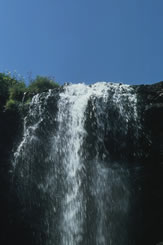 Wastewater recycling of olive oil mills in Mediterranean countries -Demonstration and sustainable reuse of residuals
Wastewater recycling of olive oil mills in Mediterranean countries -Demonstration and sustainable reuse of residuals
- Within the frame of the project the project partners will develop a
concept for the efficient and cost effective treatment of olive mill
wastewater (OMW) in Mediterranean countries.
- A pilot plant will be constructed in Crete and the processed wastewater
(WW) will be reused in a brickyard or in agriculture. Purification methods
which are adapted to the regional climatic conditions and the composition of
the WW have to be used for the WW treatment. - After a technology comparison
of purification methods used in the Mediterranean the existing procedures
have to be optimised in order to ensure the reduction of the loads below
specific limits under consideration of low investment and operating costs.
- The threshold values have to be determinate and established for the
different reuses (industry and agriculture).
- In the frame of the project the partners will construct a treatment plant
for an existing olive mill in the municipality of Mousouron/Crete. - The
actually occurring environmental problems by the untreated wastewater of the
olive oil mills will be solved. The WW will be treated by "classical"
aerobic and anaerobic in-plant treatment steps to reduce the organic
contamination and, by the covering of the anaerobic treatment step, to
produce biogas.
- A biological treatment by the Epuvalisation technology and a constructed
wetland system, which are cost-effective possibilities for the water
treatment, will be installed and compared with the common aerobic treatment.
The treated water will be reused for irrigation or as a fertiliser in
agriculture (improvement of soil structure) and for the direct plant
production in the Epuvalisation treatment. The separated solid residuals
will be used as biomass (valorisation of waste).
| Project number | ICA3-CT-1999-00011 | ||
|---|---|---|---|
| Subject(s) | no translation available | ||
| Acronym | WAWAROMED | ||
| Geographical coverage | Belgium, Greece, Germany, Morocco, Tunisia, Spain | ||
| Budget (in €) | 899240 | ||
| Programme | INCO MED (FP5) | ||
| Web site | http://www.fh-aachen.de | ||
| Objectives | - Scientific objectives: * Development of effective biological treatment technologies for OMW. * Optimisation of the effluent quality in relation to the afterwards utilisation in a brickyard and agriculture (definition of the necessary water quality). * Comparison (cost and effluent quality comparison) of aerobic in-plant treatment and biological systems (Epuvalisation and constructed wetlands). * Optimisation of the biogas production by anaerobic treatment of the olive oil wastewater (criteria: amount of produced biogas m3/d). - High priority should have be the reduction of the total amount of wastewater of the olive oil mill in the municipality of Mousouron. - The effluent quality of the treated water will be adapted to the planned afterwards utilisation (brickyard, agriculture). This will help to reduce the fresh water demand of the brickyard. - Therefore the required processed water from the olive oil mill has to fulfil the quality demand for the water utilisation for the use in the brick production. Because of the high temperatures in the process of the brick baking the water quality can be "lower" than for other WW reuse possibilities |
||
| Results | - The operation and comparison of conventional and natural treatment systems
will show the achieved effluent quality and will state the specific
treatment costs of each technique. The reuse of treated wastewater will
lower the fresh water demand in agriculture and industry. Nutrients in the
wastewater will be reintroduced to the soil. - Thus most of the actual occurring problems in the range of the OMW processing as: • Insufficient separation of solids and organic contamination from the wastewater, • Difficult de-colouring of the wastewater, • No reuse of OMW can be overcome and solved. The treatment technologies will be better adapted to the mainly small decentralised olive production infrastructure in the Mediterranean. |
||
| Period | [01/03/2000 - 28/02/2003] | ||
 you are not logged in
you are not logged in





